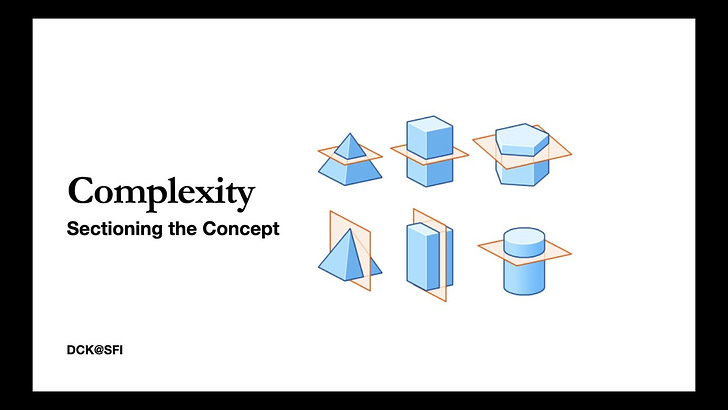Complexity, Emergence
I’ve spoken often of Complexity and Emergent properties of Complex Systems here, describing the living organism as a Complex System not amenable to simple linear mechanical description such as posited in Descrates’ iatromechanist arguments that inform contemporary conventional medicine (which were largely based on his observations of hydraulic statuary in the royal gardens at Versailles, suggesting that the active Hand of the Judeo-Christian God acting through the Pineal played the role of the animating hydraulic forces of that statuary.
(See my essay on Materialism, Vitalism, Emergentism, Dynamism for background)
A good description of Complexity is, well, a Complex thing. The work of the Santa Fe Institute, a think tank dedicated to the study of Complexity, is the best resource; the following video, created by David Krakauer, a long-term fellow of the Institute for Advanced Study at the Santa Fe Institute, available on YouTube, presents perhaps the most cogent description of Complexity and the property of Emergence (characteristic of Complex Systems) that I’ve come across. Importantly, Complexity is something other than Complicatedness.
Warning - this fellow’s a genius, and approaches this topic as if we were as well; I’m torn between wishing he’d talk down to us, and feeling delighted that he doesn’t (tho I suspect, from his perspective, he actually is).
Pay particular attention when he comes to Emergence (at 17 minutes in). When he discusses “looking under the hood” (starting at 18 minutes in), reflect on Hahnemann’s audacious footnote to aphorism 1 in the Organon
His mission is not, however, to construct so-called systems, by interweaving empty speculations and hypotheses concerning the internal essential nature of the vital processes and the mode in which diseases originate in the invisible interior of the organism, (whereon so many physicians have hitherto ambitiously wasted their talents and their time) ; nor is it to attempt to give countless explanations regarding the phenomena in diseases and their proximate cause (which must ever remain concealed), wrapped in unintelligible words and an inflated abstract mode of expression, which should sound very learned in order to astonish the ignorant—whilst sick humanity sighs in vain for aid. Of such learned reveries (to which the name of THEORETIC MEDICINE is given, and for which special professorships are instituted) we have had quite enough, and it is now high time that all who call themselves physicians should at length cease to deceive suffering mankind with mere talk, and BEGIN now, instead, for once to ACT, that is, really TO help and to cure.
When he discusses alphaGo (alphaZero), the computer program that plays the Chinese strategic board game Go, reflect on Hahnemann’s concept of the Dynamis similarly orchestrating the operations of the living organism in health & disease (thoughout the Adaptive Cycle that I’ve discussed in my On the Nature of Disease series).


